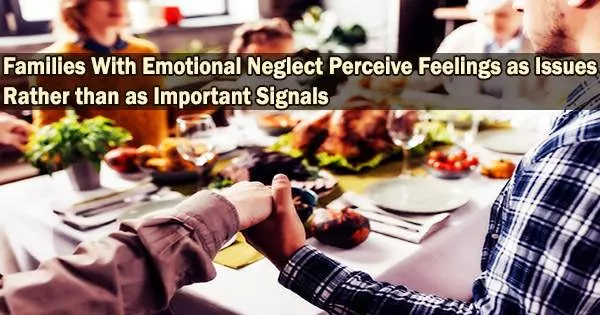Thanksgiving holiday will be a time of thanksgiving for many families, but there will be a problem. The elephant will be present, but they won’t be able to see it. It will cause you to feel disconnected, lonesome, disappointed, unhappy, or let down.
When spending time with their families, some people may wonder why they are bored. Others may be perplexed as to why particular family members appear irate, wounded, or depressed. Others will be perplexed as to why they can’t just accept their situation and be content with what they have. Most of these people have no way of recognizing that emotional neglect is quietly sapping the life out of their relationships and weakening the joy and connection they ought to be feeling in their family.
Emotional neglect has a way of making family holidays like Thanksgiving which should feel welcoming, loving, and warm fall short.
Long after the kids have grown up, the effects of emotional neglect from childhood can still be felt in the family. It tempers the warmth, cools the welcome, and weakens the affection. Unacknowledged, unspoken-about, unresolved emotions set the scene for a family portrait that no one can see but that everyone can sense. They are the persistent, dreary fog that obscures the family’s view of one another.
The members of an emotionally negligent family frequently have hazy feelings of dissatisfaction and discontentment during holidays, or worse, mixed emotions of confusion, hurt, and despair.
Childhood Emotional Neglect
When a family does not “see” the feelings of its members, it results in emotional neglect in children. Feelings are typically ignored or made to seem like a burden in a home when there is emotional neglect.
These households teach their kids to suppress and deny their own emotions. They are taught how to suppress their emotions and steer clear of sensitive situations. They discover that having in-depth conversations and expressing one’s feelings, even when those feelings are favorable, are undesired or even embarrassing.
Even if it goes unnoticed and unintentionally (which it frequently does), the family that squelches, squashes, or shames the emotions of its members pays a tragic and expensive price. It may look fantastic, but it doesn’t taste the same as a cake that hasn’t been made with sugar. It may appear normal from a distance, but up close, you can see that everyone is just going through the motions, much like a baseball game played without the ball.
If this is your family, you may feel vaguely disappointed and let down by your family on holidays. You may find yourself dreading them. You may feel bored and disconnected, angry, hurt, left out, or sad when with your family but have no idea why.
If you suspect this may be your family, or know that it is, how do you take care of yourself so that you can enjoy Thanksgiving?
5 Tips for the Emotionally Neglected at Thanksgiving
- Have a support person: Try to have one person with you who understands your situation. If they are aware of the impact of emotional neglect, it will help. When you most need it, a spouse, sibling, or dependable friend can provide you with a lot of support. It is reassuring and grounding to look across the room into your support person’s understanding eyes. If they are unable to accompany you, ask if they can be reached by phone or text.
- Keep your expectations realistic: Because of the way our brains are built, we naturally anticipate our families of origin to nurture and care for us. But if you truly embrace those expectations in a dysfunctional home, you could end up feeling doubly empty. Before you travel, make an effort to lower your expectations so that you are prepared. This will help protect you from feeling disappointed and let down.
- Be aware of your feelings: You could feel a number of distinct feelings during the day, such as frustration, emptiness, boredom, rage, or loneliness. As soon as these emotions appear, pay attention to them. Accept, identify, and allow yourself to experience them. You have good reason to be experiencing those feelings, and you can use them to better comprehend how your family affects you in the future.
- Be thankful for your strengths: Be aware that, in some essential ways, experiencing emotional neglect as a child has given you amazingly strong character. You’ve become self-reliant since you’ve been emotionally ignored. On this day, think of the blessings your family has provided you and the advantages of your upbringing. Whether you recognize it or not, the emotional neglect you experienced as a youngster helped you learn how to be self-sufficient, resourceful, and charitable. These are all things to be grateful for.
- Focus on self-care: Get some exercise and wear clothes you feel comfortable and good in. Stay at your Thanksgiving family gathering only as long as you are feeling good enough, and not one minute longer. This is a day when it’s especially important to put yourself first.
The Takeaway
Emotional neglect passes through the generations of a family unseen and unnoticed. Your parents may have simply done what most humans do: raised you very much in the same way they were raised. That’s why it’s so often no one’s fault.
For your healing, it’s important to acknowledge everything you did not get from your family. On this day, work on accepting both what you didn’t get, what you did get, and why.
Try your best to keep in mind that everything your parents couldn’t and can’t give you is possible to give yourself now. You can acknowledge, validate, and accept your feelings and regard them as the expressions of your deepest self that they are.
And on Thanksgiving, as well as every other day of the year, you can honor your deepest, neglected self by taking steps to take care of yourself emotionally. This way, you will stop the generations of emotional neglect in their tracks.
















